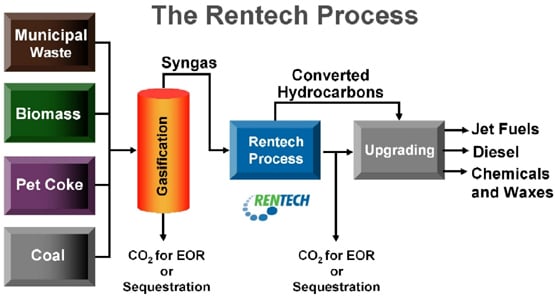While most companies in the gasification industry are
concentrated on proving the technology and securing commercial contracts,
Rentech, Inc. lept ahead to the next step. Setting its sights on the Holy Grail
of waste to energy, the company focused on creating synthetic transportation
fuel that is clean enough to be used in pipelines and engines.
Rentech has developed a patented version of the
Fischer-Tropsch process, utilizing components from smaller companies it has
acquired over several years. Dubbed the Rentech Process, the company uses one
of two gasifiers, a catalyst, reactor and upgrader to convert biomass and waste
materials into ultra-clean synthetic fuel and chemicals.
Although the Rentech Process can work with a variety of
feedstocks, the company is primarily focused on cellulosic materials. After
purchasing SilvaGas, Inc. in 2009, Rentech began offering the Rentech-SilvaGas
gasifier. The patented technology was originally developed in collaboration
with Battelle Labs and the U.S. Dept. of Energy as part of its Biomass Power
Program. A unit ran for several
years in the McNeil Power Station of Burlington, Vt. although web searches
haven’t been able to verify if it is still in operation or owned by Rentech.
Rentech also owns the Rentech-ClearFuels gasifier, which has
a product demonstration unit in Commerce City, Colo. Using a hydrothermal
reformer, the gasifier produces hydrogen in addition to a syngas. According to
transcripts of the company’s quarterly earnings call to investors, Rentech
purchased SilvaGas and its gasifier because it was further down the path to
commercial development than the one it had been developing with ClearFuels.
 |
| Courtesy: Rentech, Inc. |
The iron-based catalyst used in the Rentech Process is the
most critical component, according to the company. As the only North
American-based company using it, the iron-based catalyst is mixed with liquid
wax in a slurry bubble column reactor. The syngas is then upgraded to synthetic
diesel fuel (RenDiesel) or jet fuel (RenJet) using UOP’s upgrader. The jet fuel
produced can be blended with conventional jet fuel for use in military and
smaller commercial planes.
While Rentech was initially involved in several projects,
the 2011 fourth-quarter earnings call transcript states that they have altered
their direction and are backtracking a bit. The company has abandoned proposed
projects in Port St. Joe, Fla. and Natchez, Miss. and is trying to find a new
outlet for the rights to the 1.3 million tons of timber it purchased from the
Province of Ontario.
Better BTU Take: While
we applaud Rentech’s initiative, we feel that this is yet another illustration
of a company investing in several projects before having a clear idea of what
is actually involved in developing a project of this magnitude. With the rate
of announced projects exponentially higher than completed projects, each
cancelled project lends credibility to detractors from the renewable energy
industry that say it doesn’t work.
As every company in this industry has had to overcome both
financial and regulatory obstacles, we look forward to seeing where Rentech
goes after regrouping.
